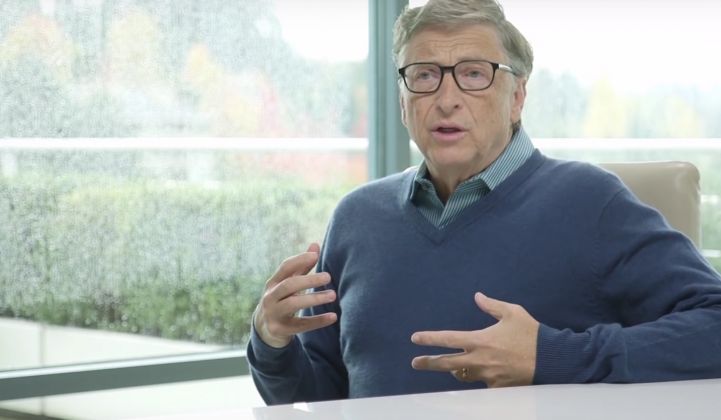Bill Gates launched a multibillion-dollar public-private partnership today to fund research and development of innovative clean energy technologies intended to lower carbon emissions and improve access to energy worldwide.
Gates, a billionaire philanthropist with an interest in energy, introduced the initiative to kick off the United Nations climate talks in Paris. The partnership was established with 27 other prominent investors from 10 countries.
The Breakthrough Energy Coalition -- which includes Amazon founder Jeff Bezos, Facebook’s Mark Zuckerberg, Khosla Ventures founder Vinod Khosla and Alibaba founder Jack Ma -- seeks to complement government investments in basic and applied research with long-term financial commitments to commercializing early-stage technologies.
“The existing system of basic research, clean energy investment, regulatory frameworks, and subsidies fails to sufficiently mobilize investment in truly transformative energy solutions for the future,” reads the coalition’s website. “We can’t wait for the system to change through normal cycles.”
The group notes that governments still play a key role in supporting fundamental research in low-carbon technologies.
To that end, President Obama and French President François Hollande announced the “Mission Innovation” initiative today. Under the program, 20 countries made commitments to double their respective clean energy research and development investment over five years.
The group -- which includes some of the most populous and polluting nations in the world -- comprises Australia, Brazil, Canada, Chile, China, Denmark, France, Germany, India, Indonesia, Italy, Japan, Mexico, Norway, Republic of Korea, Saudi Arabia, Sweden, the United Kingdom, the United Arab Emirates and the United States.
These countries represent 75 percent of the world’s carbon dioxide emissions from electricity, and more than 80 percent of the world’s clean energy R&D investment. These investments amount to about $10 billion annually, including $5 billion annually by the United States, the New York Times reports.
“Our climate imperatives, coupled with the world’s need for energy and electricity, mean that we don’t have the luxury of decades to develop and deploy new technologies,” wrote the White House in a statement.
Mission Innovation participants will hold their first implementation meeting in early 2016. It’s currently unclear which technologies will be the focus of the program.
On a press call yesterday, Energy Secretary Ernest Moniz said R&D spending would vary based on geographic need.
"The diversity of the energy situations [and] energy interests of these countries also mean that as each country shapes its portfolio of increased energy R&D, we will be seeing a whole range of technologies emphasized in different places," said Moniz.
The Breakthrough Coalition website lists five broad target sectors: electricity generation and storage, transportation, industrial use, agriculture and energy system efficiency.
Important progress has already been made in the cost reduction and deployment of several clean energy technologies, such as solar PV. Renewable energy projects accounted for almost half of all new power plants in 2014, according to the International Energy Agency’s World Energy Outlook 2015 report. Roughly 60 percent of new investment last year went into renewables, and an increasing amount is being invested in developing nations.
However, the IEA calculated that the world is still on course for a temperature increase of 2.7 degrees Celsius -- significantly above the 2-degree increase considered to be the threshold of dangerous warming. “A major course correction is still required,” according to the report.
For Gates, a long-term climate solution relies on energy breakthroughs.
“The renewable technologies we have today, like wind and solar, have made a lot of progress and could be one path to a zero-carbon energy future,” Gates wrote on his personal blog. “But given the scale of the challenge, we need to be exploring many different paths -- and that means we also need to invent new approaches.”
In June, Gates announced that he plans to invest $2 billion of his personal fortune in clean energy technology over the next five years. Overall, the Mission Innovation initiative is considered to be the single largest R&D fund in history, sources told E&E News' ClimateWire.
Today’s announcement is expected to bolster talks at the U.N. climate conference, which began on Sunday. More than 120 heads of state are expected to attend the 12-day event, and more than 180 countries have already submitted individual climate plans.
Watch Bill Gates talk about his vision for the future of energy:



